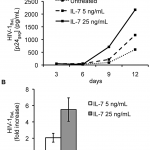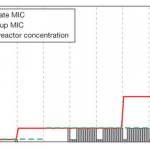Microbes always win
One of the things that bugs me most in pop-sci and woo-woo science is the obsession with "boosting" the immune system. The immune system is in a constant balancing act - tip it too far one way and even normally harmless bacteria become life-threatening. But tilt it too far in the other direction, and you can end up with things like allergies and autoimmunity. And some pathogens have learned to take advantage of your normal immune responses, meaning that "boosting" your immune system can sometimes do more harm than good. A good case-in-point is a recent paper published in PLoS Pathogens:
IL-7…
A "potentially historic" blizzard is barreling down on us here in New England, and is poised to drop up to two feet of snow on Boston. All of the schools in the area preemptively closed, our public transit system is shutting down at 3:30pm, and trying to buy groceries last night was bedlam. The snow is just now beginning to fall. Winter in New England can be rough, especially for a California-raised boy like me. It's not just because of the snow and cold, it's also the influenza and common colds.
Source - Flickr user "Placbo"
The fact that the rate of some infections can vary by…
In case you missed it, over the past couple of days there have been reports of an outbreak of Ebola hemorrhagic fever virus in Uganda. As of this writing, the most recent report I've seen puts the death toll at 16, with a few other suspected cases. Ebola is terrifying for a number of reasons - it's readily transmissible, it has a remarkably high and rapid lethality (25-90% case fatality rate within days to weeks), and the way it kills is gruesome - causing massive bleeding from all orifices. There's no vaccine or cure.
The good news from an epidemiology standpoint…
When folks in my lab think about biological problems, we think about basics. A pathogen has some molecular component that trips a sensor on the outside of a cell. That sensor (the receptor) grabs on to some adapter proteins and starts a cascade of chemical reactions catalyzed by various enzymes, which eventually leads to the activation of a transcription factor or factors that changes the behavior of a cell. We think at the level of the cell, at the level of the protein and at the level of the molecule. Occasionally, if we write a paper and the reviewers insist, we might do an assay to see if…
I feel like I've seen this movie before. A group of thieves need to gain entry to a highly secured vault. The vault door is nearly impregnable, and once inside, there are motion sensors, security cameras and laser trip lines, all of which sound the alarm. When the security guards hear what's happening, they are told to release a deadly gas into the vault, killing anyone inside. But Salmonella enterica, that charming bug responsible for all manner of unpleasantness, is a clever burglar. It has learned to live inside macrophages - cells that are usually used to destroy bugs - and uses their own…
I've said it before, and I'll say it again - pathogens are devious little bastards:
Discovery of a Viral NLR Homolog that Inhibits the Inflammasome
In order to respond to a virus, a cell first has to recognize that it's there. There are a lot of ways the cell tries to do this - some receptors (like the TLRs I study) look for features that are unique to pathogens that are outside the cell. Others look for molecules (like DNA and RNA) that are shared between us and pathogens, but are in the wrong place (DNA outside the nucleus is a pretty sure sign of infection).
NOD-like receptors (that's the…
The vermin only teaze and pinch
Their foes superior by an inch.
So, naturalists observe, a flea
Has smaller fleas that on him prey;
And these have smaller still to bite 'em,
And so proceed ad infinitum*:
-Jonathan Swift
Even though I study the immune system, it always amazes me just how many creatures make their living by parasitizing other creatures. It's like the food chain turned on its head. The food chain you probably learned about in school says that many organisms feed on other organisms, which get fed on by others until you reach whatever ultimate predator sits at the top of the food…
(No pun intended)
This just sucks:
As cholera rampages through Haiti, some epidemiologists are warning that the country could face more than half a million cases over the coming year. Yet tracking and treating the disease is proving increasingly difficult as civil unrest grips the county.
As if Haiti hasn't already suffered enough. Vibrio cholerae, the bacterium that causes the disease is transmitted in contaminated water, and can divide rapidly in the digestive tract. The bacterium causes disease by secreting cholera toxin, a group of proteins that hitches a ride into the cell, sneaks…
I started writing this post before I read ERV dissecting some "the immune system is perfect" BS. Go read hers, then come back if you want more.
Now that I've gone through the basics of a typical immune response, I think it's necessary to point out some of its many flaws. In many of the immunology courses I've taken, the mammalian immune system is presented almost as the pinnacle of evolution, but it is far from perfect. In fact, in many ways, we might be better off if it had never evolved at all.
First up - Autoimmunity. T-cells and B-cells generate random receptors that can in principal see…
[This post was originally published at webeasties.wordpress.com]
Antibiotics are awesome. They can be credited with saving more human life than any other invention and have been one of the best advancements in public health second only (maybe) to sanitation. But, as with all things pathogen related, the microbes are fighting back. Antibiotic resistance is on the rise, and diseases like MRSA (Methicillin-resistant Staphylococcus aureus) have been making the rounds in hospitals and causing a significant number of deaths.
Antibiotic resistance arises due to random mutation and natural…


